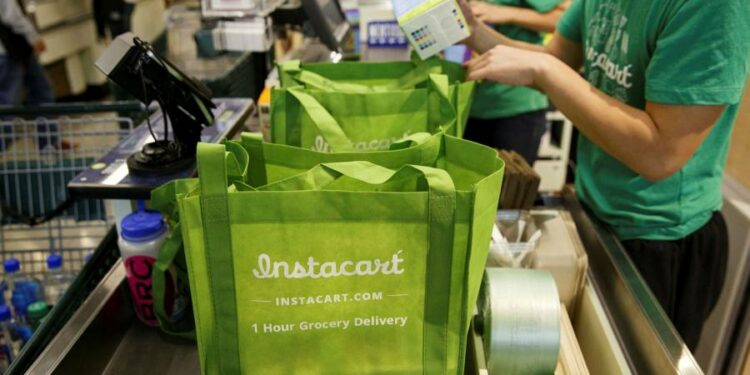Grocery unicorn Instacart’s valuation downgrade could presage a freeze in tech initial public offerings. The tech heavy Nasdaq index is off 10 per cent year to date — an off-putting prospect for private companies. But unfavourable market conditions are only partially to blame for Instacart’s problems.
Earlier this month, the US online delivery company slashed its value by 40 per cent to $24bn. Unlike down rounds driven by external investors, this was Instacart’s own decision. Employees in the stock plan will benefit when the shares rebound, the company said.
Those same employees should keep in mind that slowing growth could hold back such a recovery. The staggering rise in Instacart’s valuation — up fivefold in less than two years — combined with heavy competition, are the real culprits.
Instacart, founded in San Francisco in 2012 and backed by big venture capital firms including Andreessen Horowitz, has struggled to keep its pandemic boom going. It is surrounded by well-financed competitors, including Walmart, Amazon and Gopuff. Using workers to pick out items from some 600 retailers, it must keep pouring money in to reduce delivery times. A newly announced investment in mini warehouses is designed to enable delivery in 15 minutes. Prospective shareholders should remember that ride-share companies operating in a similarly expensive and competitive market continue to trade below their listing prices.
Fidji Simo, Instacart chief executive, who arrived from Facebook last summer, talks of the importance of advertising and other services that diversify revenue. But until numbers are broken out, it is impossible to know how much.
For now, the price looks reasonable. Instacart is reported to have increased revenue a fifth to $1.8bn last year, 13 times its new valuation. That is below Gopuff, valued at 15 times estimated trailing revenue. But it is still higher than listed restaurant food delivery service DoorDash, which is valued at 8 times trailing revenue despite sales growing by more than two-thirds last year. The valuation reduction is unlikely to be kicked into reverse anytime soon.











